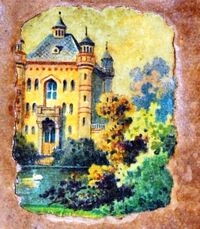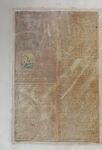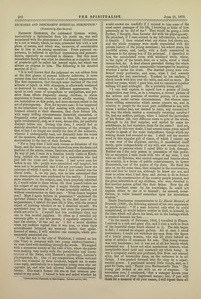<Untitled>
...

Zschokke and Deschamps Spiritual Perseption*
Heinrich Zschokke, the celebrated German writer, instinctively a Spiritualist from his youth up, was well acquainted with the phenomena of rhabdomancy (divination by a rod or wand), which, he says, presented him with a new phase of nature, and which was, moreover, of considerable use to him in his mining operations. From personal experience, he believed in spiritual impressions and presentiments, especially as conveyed in dreams. But this most remarkable faculty was what he describes as a singular kind of prophetic gift he called his inward sight, but which was always an enigma to him. The following is his detailed account of it:—
“It is well known that the judgment we not seldom form at the first glance of persons hitherto unknown, is more correct than that which is the result of longer acquaintance. The first impression, that through some instinct of the soul attracts or repels us with strangers, is afterwards weakened or destroyed by custom, or by different appearances. We speak in such cases of sympathies or antipathies, and perceive these effects frequently among children, to whom experience in human character is wholly wanting. Others are incredulous on this point, and have recourse rather to the art of physiognomy. Now, for my own case: It has happened to me sometimes on my first meeting with strangers, as I listened silently to their discourse, that their former life, with many trifling circumstances therewith connected, or frequently some particular scene in that life, has passed quite involuntarily, and, as it were, dream-like, yet perfectly distinct before me. During this time, I usually feel so entirely absorbed in the contemplation of the stranger life, that at last I no longer see clearly the face of the unknown, wherein I undesignedly read, nor distinctly hear the voices of the speakers, which before served in some measure as a commentary to the text of their features.
“For a long time I held such visions as delusions of the fancy, and the more so, as they showed me even the dress and motions of the actors, rooms, furniture, and other accessories. By way of jest, I once in a familiar family circle at Kirchberg related the secret history of a seamstress who had just left the room and the house. I had never seen her before in my life: people were astonished and laughed, but were not to be persuaded that I did not previously know the relations of which I spoke; for what I had uttered was the literal truth. I, on my part, was no less astonished that my dream-pictures were confirmed by the reality. I became more attentive to the subject, and, when propriety admitted it, I would relate to those whose life thus passed before me the subject of my vision, that I might thereby obtain confirmation or refutation of it. It was invariably ratified, not without consternation on their part. ‘What demon inspires you? Must I again believe in possession?’ exclaimed the spirituel Johann von Riga, when, in the first hour of our acquaintance, I related his past life to him, with the avowed object of learning whether or no I deceived myself. We speculated long on the enigma, but even his penetration could not solve it. I myself had less confidence than any one in this mental jugglery. So often as I revealed my visionary gifts to any new person, I regularly expected to hear the answer, ‘It was not so.’ I felt a secret shudder when my auditors replied that it was true, or when their astonishment betrayed my accuracy before they spoke, Instead of many, I will mention one example, which preeminently astounded me.
“One fair day in the city of Waldshut, I entered an inn (the Vine) in company with two young student-foresters; we were tired with rambling through the woods. We supped with a numerous society at the table d'hote, where the guests were making very merry with the peculiarities and eccentricities of the Swiss, with Mesmer’s psychology, Lavater’s physiognomy, &c. One of my companions, whose national pride was wounded by their mockery, begged me to make some reply, particularly to a handsome young man who sat opposite us, and who had allowed himself extraordinary
license. This man’s former life was at that moment presented to my mind. I turned to him and asked whether he would answer me candidly if I related to him some of the most secret passages of his life, I knowing as little of him personally as he did of me? That would be going a little further, I thought, than Lavater did with his physiognomy. He promised, if I were correct in my information, to admit it frankly. I then related what my vision had shown me, and the whole company were made acquainted with the private history of the young merchant; his school years, his youthful errors, and, lastly, with a fault committed in reference to the strong box of his principal. I described to him the uninhabited room with whitened walls, where, to the right of the brown door, on a table, stood a black money-box, &c. A dead silence prevailed during the whole narration, which I alone occasionally interrupted by inquiring whether I spoke the truth. The startled young man confirmed every particular, and even, what I had scarcely expected, the last mentioned. Touched by his candour, I shook hands with him over the table, and said no more. He asked my name, which I gave him, and we remained together talking till past midnight. He is probably living still!
“I can well explain to myself how a person of lively imagination may form, as in a romance, a correct picture of the actions and passions of another person, of a certain character, under certain circumstances. But whence came those trifling accessories which nowise concern me, and in relation to people for the most part indifferent to me, with whom I neither had, nor desired to have, any connection? Or, was the whole matter a constantly recurring accident? Or, had my auditor, perhaps, when I related the particulars of his former life, very different views to give of the whole, although in his first surprise, and misled by some resemblances, he had mistaken them for the same? And yet, impelled by this very doubt, I had several times given myself trouble to speak of the most insignificant things which my waking dream had revealed to me. I shall not say another word an this singular gift of vision, of which I cannot say it was ever of the slightest service; it manifested itself rarely, quite independently of my will, and several times in reference to persons whom I cared little to look through. Neither am I the only person in possession of this power. <... continues on page 7-163 >
* Extracted from Planchette, by Epes Sargent, Trubner and Co., 1869.
Editor's notes
Sources
-
London Spiritualist, No. 304, June 21, 1878, pp. 292-3


